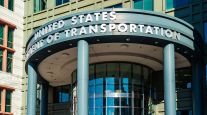Restart Changes ‘Reasonable,’ FMCSA Says in HOS Court Brief
By Timothy Cama, Staff Reporter This story appears in the Oct. 1 print edition of Transport Topics.
The federal government defended its latest hours-of-service rule last week, telling a U.S. court that it “acted at the height of its expertise and discretion” when it decided in December to put new restrictions on the 34-hour restart provision, while retaining the 11-hour driving day.
“The HOS rule reflects [the Federal Motor Carrier Safety Administration’s] weighing of scientific evidence and its careful consideration of the potential impacts of health and safety, as well as the costs and the effects of the rule on the public and the regulated industry,” the agency wrote in a Sept. 24 filing.
The restart changes are “reasonable and adequately explained,” and any potential safety improvements from cutting back truckers’ workdays would be outweighed by a loss in productivity, the agency said.
The court brief was the first action from FMCSA in two separate lawsuits filed in February challenging different parts of the HOS rule in the U.S. Court of Appeals for the District of Columbia Circuit.
FMCSA asked the court to dismiss both cases, one from American Trucking Associations challenging the restart and another from a coalition of interest groups led by Public Citizen over the driving hours. The agency said the lawsuits lack merit, and the court should defer to the agency’s expertise and judgment.
ATA last week criticized FMCSA for asking the court to rely on its judgment.
FMCSA should be allowed to exercise its discretion only “if its rule is based on reasonable conclusions — from reliable evidence — that are adequately explained,” Rich Pianka, ATA’s deputy general counsel, told Transport Topics.
The brief showed that FMCSA “cannot demonstrate the reasonableness of its conclusions” in the rule, Pianka said.
Public Citizen and the other groups did not respond to requests for comment.
ATA said it will defend FMCSA’s 11-hour limit in an Oct. 1 court brief. All the groups that brought the latest lawsuits are scheduled to file briefs responding to FMCSA by Oct. 24.
The court has not scheduled oral arguments in the lawsuits. The cases remain separate, though they are on the same schedule and are set to be argued the same day.
In briefs filed this summer, ATA said FMCSA’s cost-benefit analysis regarding the restart provision relied on unjustifiable assumptions, while Public Citizen argued that keeping the 11-hour workday does not adequately prevent driver fatigue (7-30, p. 4).
However, FMCSA took issue with both groups in its brief last week.
“The cost/benefit analysis is based on appropriate data and scientifically sound methodologies, despite petitioners’ claims to the contrary,” FMCSA said of ATA’s argument. “The contention of ATA . . . that an unlimited restart is the only rational decision FMCSA could have made here is therefore incorrect.”
On the 11-hour driving day, FMCSA said it “conducted a scientifically valid cost/benefit analysis on this issue, and [Public Citizen’s] challenges to the assumptions methodologies of that analysis are unsound.”
“If increased safety invariably trumped cost savings, then the agency would be required not only to reject an 11-hour limit in favor of 10 but to reject a 10-hour limit in favor of a safer 9-hour limit, and then to move down the scale of lower (and therefore ‘safer’) limits,” FMCSA said.
The HOS rule, currently set to go into effect in July, limits use of the restart to once every seven days and requires two overnight periods within the restart. It also requires drivers to take half-hour breaks before working more than eight hours, another provision ATA challenged.
Public Citizen, along with Advocates for Highway and Auto Safety, the Truck Safety Coalition and two truck drivers, are seeking to have the 34-hour restart completely eliminated.
Also in its brief, FMCSA deflected criticism from ATA over its conclusion that 13% of truck-involved crashes are caused by truck driver fatigue.
While ATA had accused FMCSA of assuming that “whenever truck driver fatigue is present at the time of a crash, fatigue caused the crash,” the agency called that figure a “reasonable choice,” based on its cost-benefit analysis.
Public Citizen and the Truck Safety Coalition convinced the court in 2004 and 2007 to overturn prior versions of HOS rules that allowed 11 driving hours, but FMCSA reinstated the limit both times.
A 2009 lawsuit, joined by Advocates and the Teamsters union, was settled when FMCSA agreed to reconsider the regulation, which resulted in the December rule.




